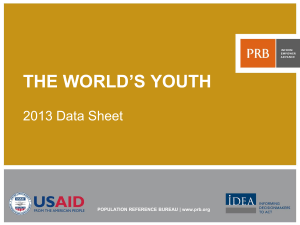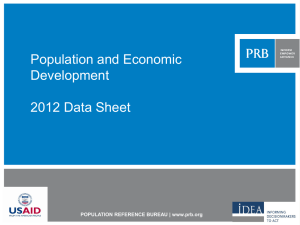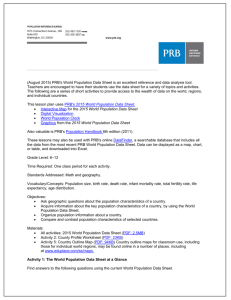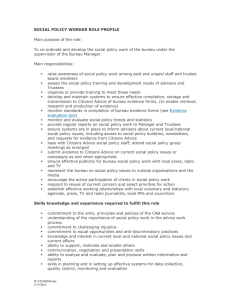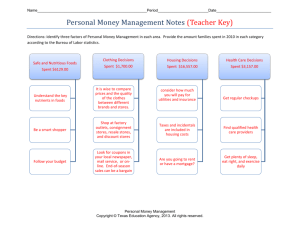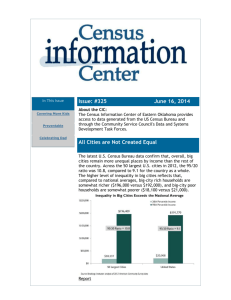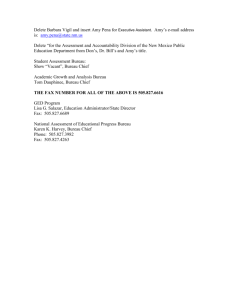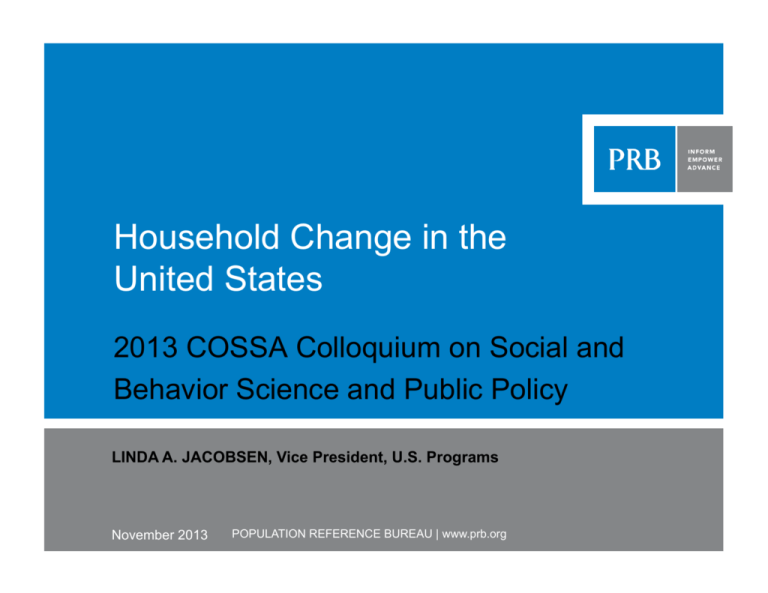
Household Change in the
United States
2013 COSSA Colloquium on Social and
Behavior Science and Public Policy
LINDA A. JACOBSEN, Vice President, U.S. Programs
November 2013
POPULATION REFERENCE BUREAU | www.prb.org
HOUSEHOLD CHANGE IN THE UNITED STATES
BY LINDA A. JACOBSEN, MARK MATHER, AND GENEVIEVE DUPUIS
Vol. 67, No. 1
SEPTEMBER 2012
www.prb.org
POPULATION REFERENCE BUREAU
Overview
Changing Household Structure
Age of householder
Race/ethnicity of householder
Education of householder
What’s Driving These Changes?
Marriage and divorce trends, including
cohabitation
Childbearing trends
Challenges in Measuring Changes
© 2013 Population Reference Bureau. All rights reserved. www.prb.org
Defining Household Types
Household
All the persons who occupy a single housing
unit
Householder
The person or one of the people ages 15+ in
whose name the unit is owned, being bought,
or rented
Relationship of all other household members
is defined in terms of their relationship to the
householder
© 2013 Population Reference Bureau. All rights reserved. www.prb.org
Defining Household Types
Family household
Includes a householder and 1+ persons
related to householder by marriage, birth, or
adoption
Can include other persons who are not related
to the householder
Nonfamily household
Includes a householder who lives alone or
only with other people who are nonrelatives
such as roommates
© 2013 Population Reference Bureau. All rights reserved. www.prb.org
Defining Household Types
Cohabiting Couples
Identified as “unmarried partners”
Can also have dependent children
Are They Family or Nonfamily?
Can be either!
Depends on which partner is designated as
the householder, and whether there are any
additional household members related to the
householder
© 2013 Population Reference Bureau. All rights reserved. www.prb.org
Growth in Number of Households
More than tripled between 1940 and 2010
From 35 million to 117 million
Outpaced population growth in every decade
across this time period
Why does household structure matter?
Impacts economic and social well-being of
individuals and families
Impacts demand for economic and social
support services
© 2013 Population Reference Bureau. All rights reserved. www.prb.org
Percent Distribution of U.S. Households by
Type, 1940 to 2010
NOTE: Percentages for subcategories may not sum to category totals due to rounding.
SOURCE: U.S. Census bureau, decennial censuses from 1940 to 2010.
© 2013 Population Reference Bureau. All rights reserved. www.prb.org
Percent Distribution of U.S. Households by
Type, 1940 to 2010
NOTE: Percentages for subcategories may not sum to category totals due to rounding.
SOURCE: U.S. Census bureau, decennial censuses from 1940 to 2010.
© 2013 Population Reference Bureau. All rights reserved. www.prb.org
Percent Distribution of U.S. Household Types
by Age of Householder, 2012
NOTE: Percentages may not sum to 100 due to rounding.
SOURCE: U.S. Census Bureau, Current Population Survey.
© 2013 Population Reference Bureau. All rights reserved. www.prb.org
Percent Distribution of U.S. Household Types
by Race/Ethnicity of Householder, 2012
*Non-Hispanic. **Includes all other single race groups and all race combinations.
NOTE: Percentages may not sum to 100 due to rounding.
SOURCE: U.S. Census Bureau, Current Population Survey.
© 2013 Population Reference Bureau. All rights reserved. www.prb.org
Percent Distribution of U.S. Household Types
by Education of Householder, 2012
NOTE: Percentages may not sum to 100 due to rounding.
SOURCE: U.S. Census Bureau, Current Population Survey.
© 2013 Population Reference Bureau. All rights reserved. www.prb.org
Geographic Distribution of Married-Couple
Families With Children, 2010
SOURCE: U.S. Census Bureau, 2010 Decennial Census.
© 2013 Population Reference Bureau. All rights reserved. www.prb.org
Geographic Distribution of Persons Living
Alone, 2010
SOURCE: U.S. Census Bureau, 2010 Decennial Census.
© 2013 Population Reference Bureau. All rights reserved. www.prb.org
Overview
Changing Household Structure
Age of householder
Race/ethnicity of householder
Education of householder
What’s Driving These Changes?
Marriage and divorce trends, including
cohabitation
Childbearing trends
Challenges in Measuring Changes
© 2013 Population Reference Bureau. All rights reserved. www.prb.org
Median Age at First Marriage by Gender,
1890 to 2011
SOURCE: U.S. Census Bureau.
© 2013 Population Reference Bureau. All rights reserved. www.prb.org
Percent of Women Who Have Ever Been
Married by Age 25, by Birth Cohort
SOURCE: U.S. Census Bureau, Current Population Survey.
© 2013 Population Reference Bureau. All rights reserved. www.prb.org
Percent of Women Who Have Ever Been Married
by Age 25, by Race/Ethnicity and Birth Cohort
SOURCE: U.S. Census Bureau, Current Population Survey.
© 2013 Population Reference Bureau. All rights reserved. www.prb.org
Percent of Women Ages 40 to 44 by Number
of Children Ever Born, by Birth Cohort
SOURCE: U.S. Census Bureau, Current Population Survey, June Supplement.
© 2013 Population Reference Bureau. All rights reserved. www.prb.org
Overview
Changing Household Structure
Age of householder
Race/ethnicity of householder
Education of householder
What’s Driving These Changes?
Marriage and divorce trends, including
cohabitation
Childbearing trends
Challenges in Measuring Changes
© 2013 Population Reference Bureau. All rights reserved. www.prb.org
Challenges in Measuring Change
Complex and fluid living arrangements
make it hard to classify households
Lags between social change and
availability of data to measure change
Joint custody of children
Cohabitation and same sex marriage
Limitations in ways data are collected and
tabulated
© 2013 Population Reference Bureau. All rights reserved. www.prb.org
For More Information
Download Population Bulletin
(http://www.prb.org/Publications/Reports/2012/us-householdchange.aspx )
Visit PRB’s DataFinder
http://www.prb.org/DataFinder/Topic/Rankings.aspx?ind=272
Create charts and maps or download data on
U.S. household types
Contact
Linda Jacobsen
ljacobsen@prb.org
© 2013 Population Reference Bureau. All rights reserved. www.prb.org

